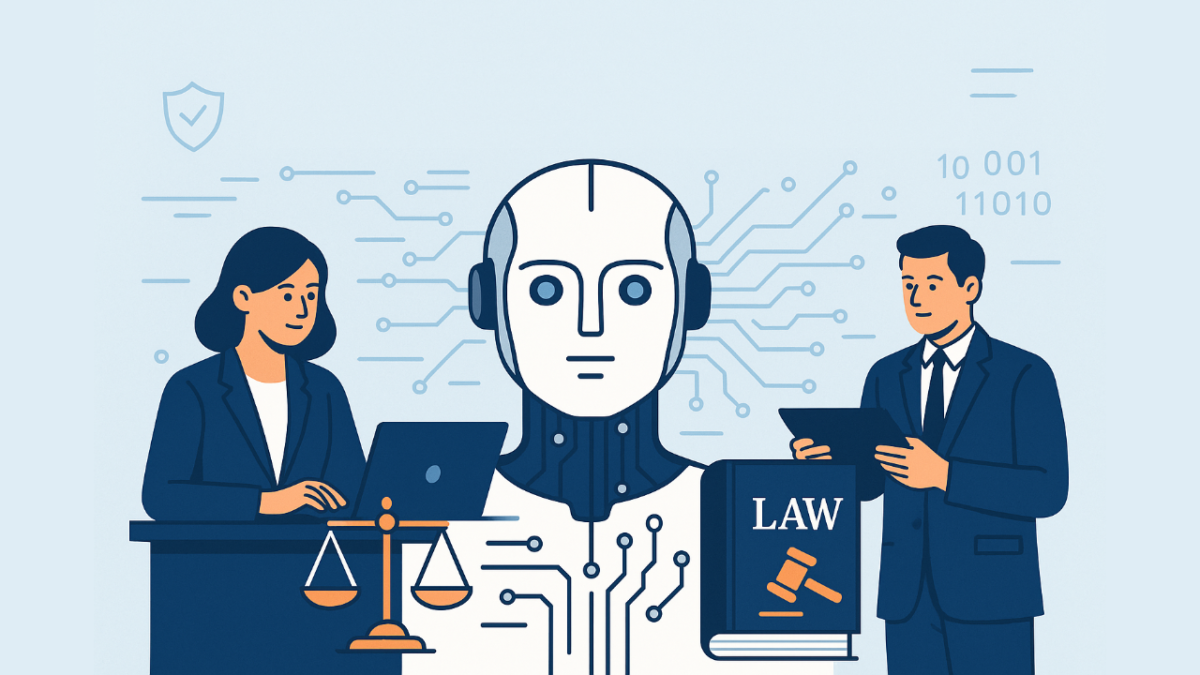Table of Contents
Introduction
The legal industry, traditionally resistant to change, is undergoing a digital revolution powered by Artificial Intelligence (AI). In 2025, AI in legal technology isn’t just a buzzword—it’s a strategic advantage reshaping how legal professionals work, make decisions, and serve clients.
In this guide, we’ll explore how AI is transforming legal workflows, improving efficiency, and unlocking new capabilities for law firms and legal departments alike.
What is AI in Legal Technology?
AI in legal tech refers to the application of machine learning, natural language processing (NLP), and data analytics to automate, streamline, and enhance legal tasks. This includes:
- Automated document review
- Legal research and case law analysis
- Predictive analytics for litigation
- Contract lifecycle management
- Client communication via legal chatbots
These innovations help legal professionals reduce repetitive tasks and focus on higher-value strategic work.
Key Use Cases of AI in the Legal Industry
Contract Review & Management
AI tools like Kira Systems and Luminance automate the review of complex contracts by:
- Extracting key clauses
- Identifying anomalies
- Flagging compliance risks
This reduces review time by up to 60% and increases accuracy.
Legal Research & Case Analysis
Platforms like Casetext and ROSS Intelligence use NLP to analyze case law, statutes, and legal precedents. Lawyers can now:
- Get faster search results
- Discover relevant judgments
- Access predictive case outcomes
This allows attorneys to build stronger cases in less time.
Litigation Prediction & Risk Assessment
Predictive analytics tools assess historical data to forecast:
- Case outcomes
- Settlement probabilities
- Judicial tendencies
Firms use this insight to develop winning strategies and advise clients more accurately.
E-Discovery
AI-powered e-discovery platforms automate the sorting and filtering of electronic documents. This dramatically cuts down the time and cost of discovery during litigation.
Legal Chatbots & Virtual Assistants
Firms are using AI chatbots to:
- Answer FAQs
- Onboard new clients
- Schedule consultations
These tools enhance client experience while reducing operational overhead.
Benefits of AI in Legal Tech
- Increased Efficiency: Automates time-consuming tasks
- Cost Reduction: Lowers the cost of service delivery
- Better Accuracy: Minimizes human error in documentation
- Faster Turnaround: Speeds up client communication and research
- Competitive Edge: Offers data-driven insights for better decisions
Real-World Example: AI in Action
- Baker McKenzie, a global law firm, adopted AI for contract review. The result? A 30% increase in productivity and faster client turnaround.
- Similarly, JP Morgan’s COIN platform reviews commercial loan agreements—doing in seconds what took lawyers 360,000 hours annually.
Implementing AI in Your Law Firm: Step-by-Step
- Assess Your Needs
Identify bottlenecks—contract review, research, or compliance. - Choose the Right Tools
Compare solutions like Luminance, Kira, and Casetext based on features and pricing. - Train Your Team
Ensure your legal staff understands how to use and trust AI outputs. - Start Small
Run a pilot program on one practice area before full deployment. - Monitor & Optimize
Use feedback and performance metrics to improve usage and ROI.
Addressing Concerns Around AI in Law
While AI boosts productivity, some challenges remain:
- Data Privacy: Legal data is sensitive. Choose vendors that comply with global standards like GDPR or ISO/IEC 27001.
- Bias in AI: Ensure training data is diverse and systems are regularly audited.
- Human Oversight: AI should augment, not replace, human lawyers.
LegalTech Trends to Watch in 2025
- Generative AI for automated legal drafts
- AI-driven compliance monitoring
- Smart contracts powered by blockchain
- Integration with practice management software
These trends indicate a shift toward intelligent, automated, and agile law firms.
Final Thoughts
AI in legal technology is not just a trend—it’s a transformative force that’s reshaping the future of legal practice. By embracing AI, law firms can gain speed, accuracy, and a serious competitive edge.
Whether you’re a solo practitioner or part of a large legal department, now is the time to start exploring how AI can future-proof your legal operations.
Call-to-Action (CTA)
Ready to embrace AI in your legal workflows?
Subscribe to iTMunch for weekly updates on the latest in LegalTech innovation or get in touch to explore AI solutions tailored for your law firm.
See Also: AI-Generated Content in B2B: Power, Pitfalls & Best Practices





